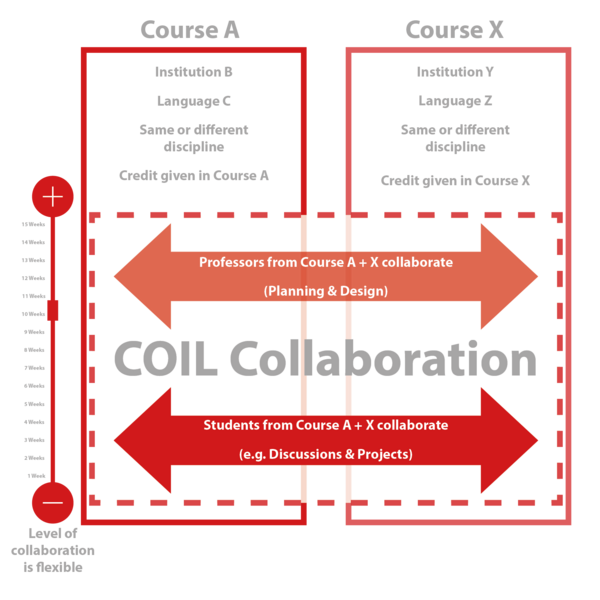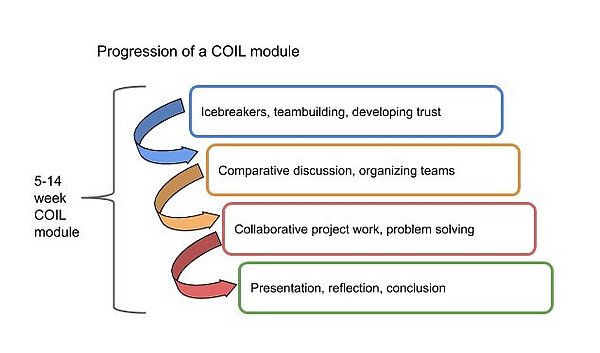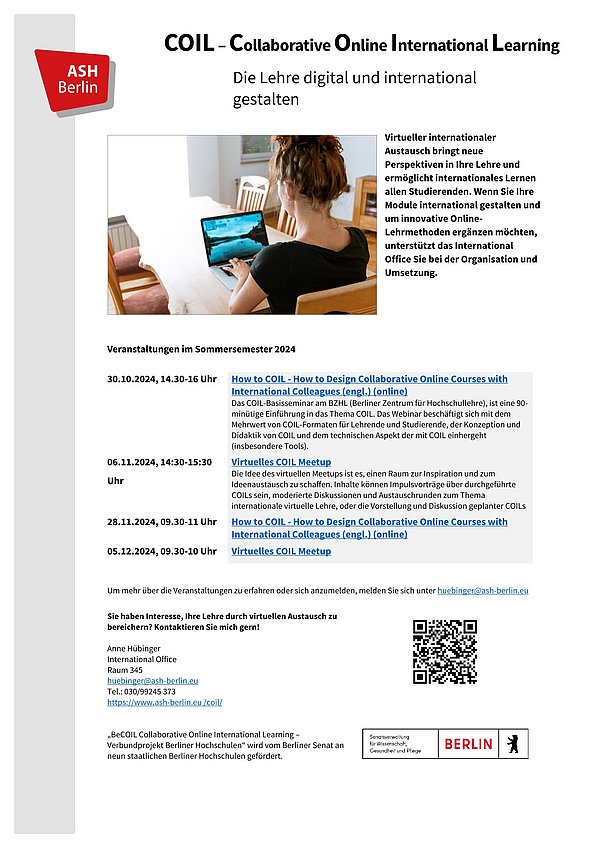Collaborative Online International Learning (COIL)
Virtual international exchange enriches teaching and makes international learning accessible to all students. If you would like to design your modules internationally and enhance them with innovative online teaching methods, the International Office will support you with the organisation and implementation.
These videos "What is COIL" were produced in the joint BeCOIL project and show the most important elements of COIL. You find the whole playlist here: COIL Videos.
COIL Self-Study Course
As part of the BeCOIL joint project, a self-study course on COIL was developed with the support of FernUniversität Hagen. The course includes several sections that provide an introduction to the topic and an in-depth exploration of key aspects such as collaboration, internationalization, and intercultural learning. Additionally, the COIL method is explained in detail, and practical resources like checklists, best practices, and further materials are made available.
The course takes approximately 4.5 hours to complete, and upon completion, you will receive a certificate.
You can register for the course independently here: COIL Self-Study Course
What is COIL?
- COIL stands for Collaborative Online International Learning.
- COILs are elements (e.g. projects) that are integrated into existing modules and supplement the seminars with international online teaching and international virtual exchange.
- Lecturers at ASH Berlin cooperate with a partner university abroad and jointly design an assignment on which students from both countries work together using digital media.
- The COILs therefore focus on cooperation between students of different nationalities - and at the same time on cooperation between lecturers.The project work thus benefits from the different experiences, perspectives and backgrounds of all participants.
The joint project BeCOIL
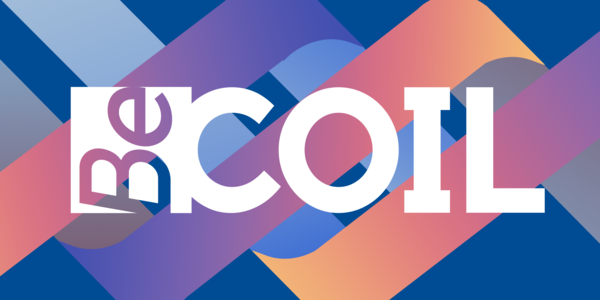
The project ‘BeCOIL Collaborative Online International Learning - Joint Project Berlin Universities’ is funded by the Berlin Senate until the end of 2024 at nine state universities in Berlin. The aim of the project is to promote and advance internationalisation at home (‘Internationalisation@Home’) at Berlin's universities. At the same time, cooperation between Berlin's universities and their international partners and with each other will be strengthened. Standards for the implementation of COILs are being developed as part of this project. We are also jointly offering further training for students and lecturers on digitalisation and international topics. With COIL, we are strengthening our international networks and offering our students and lecturers the opportunity to develop further in a global, digital learning environment. Let's shape the future of higher education together!
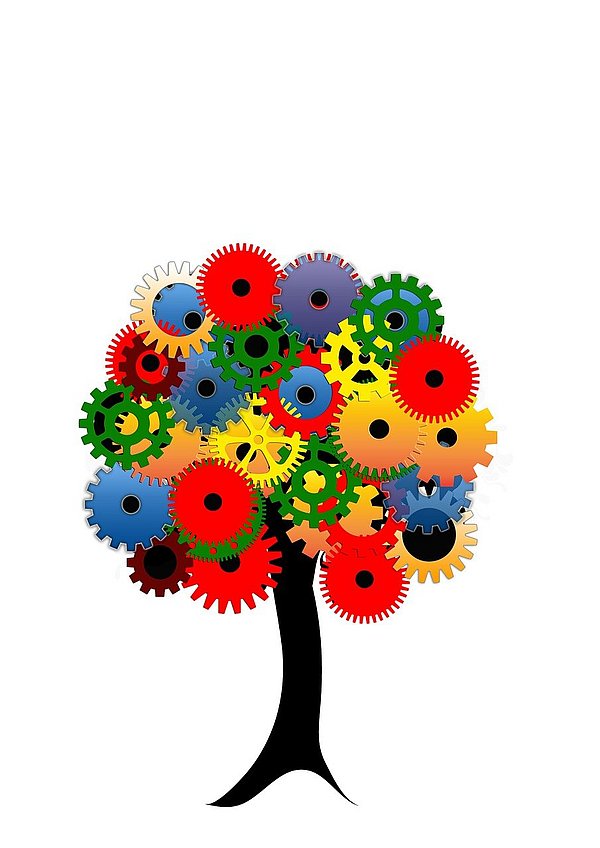
Aim of the project
In concrete terms, this means that the COIL project will develop and establish international digital teaching and learning formats that can be implemented into the curriculum in the long term if successfully realised. This will promote the participation of all students in international exchange. Non-traditional students are an important target group at ASH Berlin. These students are often in circumstances that do not allow for a traditional stay abroad. Through the successful implementation of COILs, this target group benefits from international exchange and international teaching.
Why COIL at ASH Berlin
Transcultural competences play an important role in the academic training of the SAGE professions. Graduates should be able to think in a multi-perspective way and work internationally and culturally with a wide variety of target groups. The profile of professionalised SAGE specialists includes the ability to deal with and reflect on their own culture, their own biography and their own way of acting. This also includes the ability to make international comparisons. These competences can be acquired through physical stays abroad. As these are not accessible to all students, for example due to personal circumstances or an inflexible degree programme structure, formats such as COIL enable all students to participate in international exchange.
The advantages of COIL for teaching
- By integrating COILs, teachers can make their courses more diverse. They can (further) develop their didactic, methodological and digital skills through the sensible use of different media
- Teachers can open up the ‘international classroom’: the diverse perspectives of the students enrich the courses, the teachers benefit from mutual expertise in the design of the projects.
- International and intercultural competences are further developed.
- International contacts and networks are expanded and consolidated.
Benefits of COIL for students

- Non-mobile students are given the opportunity to gain international and intercultural experience. Students who are unable to complete a ‘classic’ stay abroad due to social, health, economic or study structure-related barriers are equally encouraged to participate in COIL.
- All students are given the opportunity to learn internationally and thus have the chance to gain transcultural experience.
- Working in virtual and sometimes international teams is an essential part of the modern digitalised working world - and COIL projects provide training in this.
- Variety in the degree programme: students learn to adopt new perspectives, work in a foreign language and learn new methods (e.g. project work to explore subject areas).
What could a COIL look like?
The following structure can serve as inspiration when designing a COIL project:
- An orientation or virtual introduction - icebreakers and similar elements are important here to stimulate exchange between students and compare viewpoints and knowledge.
- A joint task: The project that the students work on together in collaboration forms the central aspect of a COIL. The students use their collective and individual knowledge to complete the task.They use tools and virtual platforms to make the exchange as effective as possible.
- A reflection task: At the end of the project, students are asked to reflect on the content of the module, the transcultural aspects of the project and the virtual exchange.
Human Rights and Children's Rights with CSULB California State University Long Beach and HAW Hamburg
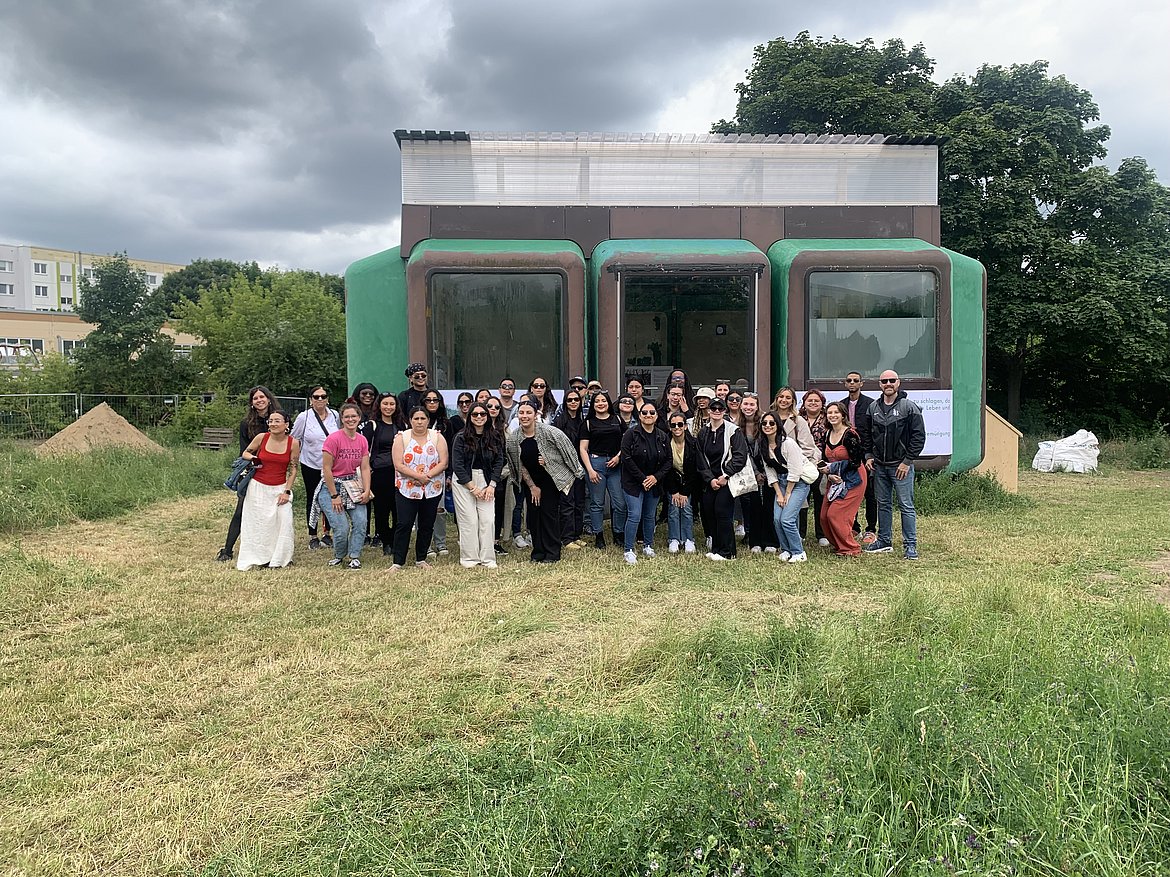
The CSLUB students started the day at ASH Berlin with a visit to the Transfer_Hub and a tour of Hellersdorf
In the summer semester of 2024, the COIL seminar Human Rights and Children's Rights was offered for the first time as a compulsory elective module in the Childhood Education programme. Led by Prof Dr Dagmar Bergs-Winkels, the seminar took place in collaboration with lecturers and students from HAW Hamburg and CSULB California State University Long Beach.
In this interdisciplinary seminar, bachelor's students from ASH Berlin worked together with master's students of social work from CSULB and HAW Hamburg. The motivation for the collaboration was the planned visit of the American students to Hamburg and Berlin. The seminar began with a hybrid kick-off at HAW Hamburg, in which the ASH students participated virtually. After the visit to Hamburg, the CSULB students travelled to Berlin and visited various social institutions in addition to ASH Berlin.
At the university, they took part in two seminars together with the Berlin students. The session of the Human Rights and Children's Rights seminar was held jointly with the students from Hamburg, supplemented by a guest lecture. During this phase, the students were divided into groups and prepared presentations on topics relevant to the seminar, which were presented in a final online meeting.
EEE4all - Euro-Education: employability for all with Croix-Rouge Compétence Centre-Val de Loire
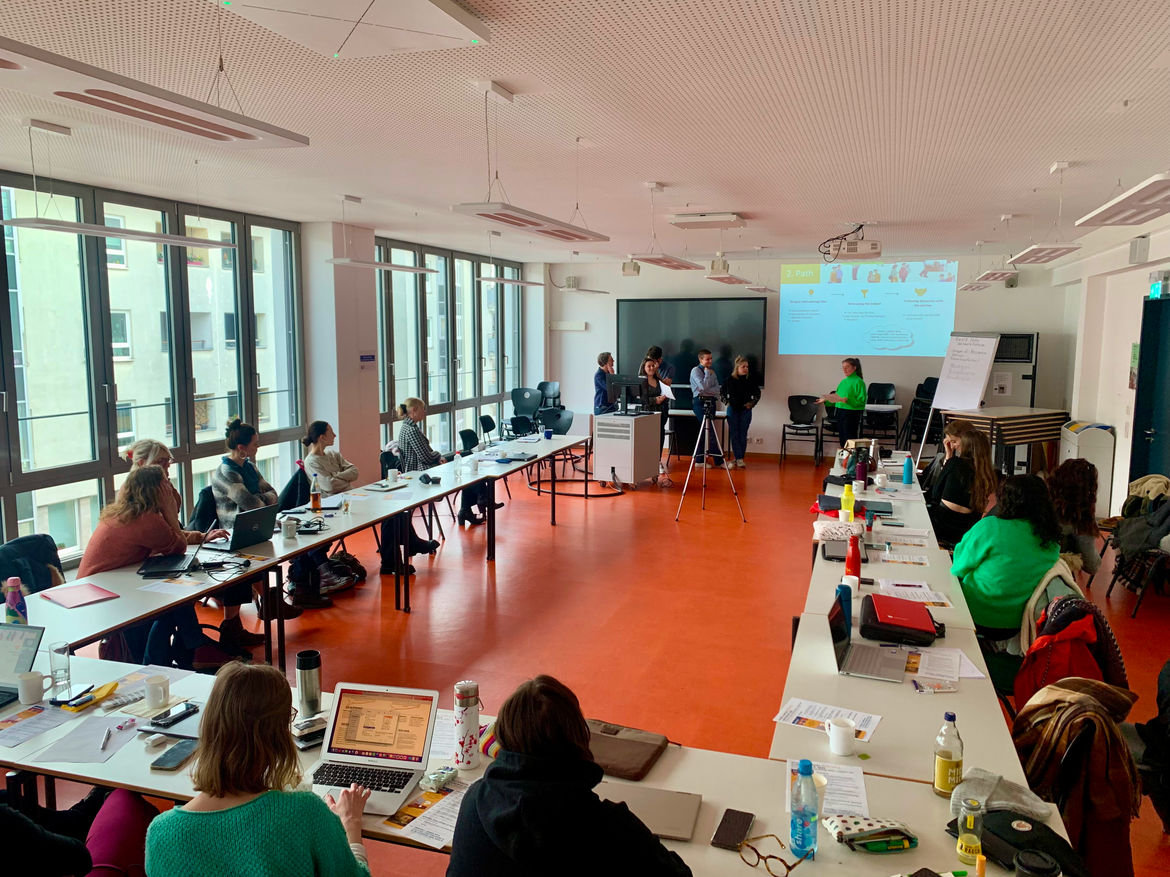
EEE4all participants present their project work (winter semester 23/24)
One example of a COIL project at ASH Berlin is EEE4all - Euro-Education: employability for all . The seminar takes place every winter semester and is offered in the Master's degree programmes Practice Research in Social Work and Education as well as Management and Quality Development in Healthcare.
EEE4all is an international, interdisciplinary project in which students are enabled to promote the employability of people who are disadvantaged on the labour market due to their migration background or disability. The module extends over two to three semesters and is the only comprehensive offer for the consecutive Master's degree programmes. ASH Berlin cooperates with a local partner in Berlin and the Croix-Rouge Compétence Centre-Val de Loire at the University of Tours. The international student exchange programme includes attendance days in France (3 to 4-day study trip to Tours) and Berlin (one-week stay for international students). The first semester is mainly taught in English and can be taken as an elective module. Please contact Prof Dr Elke Kraus (kraus@ ash-berlin.eu) or Prof Dr Heinz Stapf-Finé (stapf-fine@ ash-berlin.eu) if you have any questions.
COIL trainings and events
Together with the BZHL (Berlin Centre for Higher Education Teaching), the BeCOIL network team creates training opportunities for lecturers who want to learn more about COIL. The recurring programmes currently include the following events:
- HOW TO COIL: How to design collaborative online courses with international colleagues (de/eng) - This basic COIL seminar, which is offered in German and English, is a 90-minute introduction to the topic of COIL. The webinar deals with the added value of COIL formats for teachers and students, the conception and didactics of COIL and the technical aspect that goes hand in hand with COIL (especially tools and data protection). After the course, you will have a better understanding of COIL projects and be aware of their added value for you and your students.
- Virtual BeCOIL Meetup - The idea of the Meetup is to create a space for inspiration and exchange of ideas. The content can include keynote speeches about COILs that have already taken place, moderated discussions and exchange rounds on the topic of international virtual teaching or the presentation and discussion of planned COILs.
In addition to the training courses, the joint project members were able to present BeCOIL in various other formats:
- Hybrides COIL´DE-Bar Camp – The hybrid COIL'DE Bar Camp was a special highlight, where a wide variety of COIL topics were discussed in an open and creative atmosphere.Participants were able to contribute their own ideas and benefit from the experiences of others.
- An Equal Digital Footing – Equity in Virtual Exchange & COIL Projects – At this year's University:Future festival, BeCOIL coordinators offered a workshop with colleagues from Venezuela and the USA.The participants were able to experience how important it is for all participants to meet on an equal footing in virtual exchange formats.
Weiterführende Informationen und Quellen
Blog zum Berliner Verbundprojekt
The SUNY COIL Centre has been working for more than 15 years to promote and professionalise the practice of collaborative international online learning and virtual exchange.
The SUNY COIL Global Network serves as a hub for the exchange of information and ideas, professional support, partner referrals and resource sharing.
In conversation - Elspeth Jones and Eva Haug: COIL programme design and implementation
What is COIL (Collaborative Online International Learning)
Der Berliner Verbund kooperiert mit dem Berliner Zentrum für Hochschullehre um Fortbildungen für innovative Lehrformate anzubieten
Erasmus+ Blended Mobility Implementation Guide
Austausch und Informationen zur Online-Lehre – ASH Moodle Kurs

Logo Senat
Finanzierung
The COIL joint project of the Berlin universities is funded by the state of Berlin until the end of 2025 as part of the "Digitalisierung und Innovation" der Qualitäts- und Innovationsoffensive (2. Förderphase) .
Ms Luca Lil Wirth
COIL Project Coordinator
International Office
Room No. 345
Collaborative Online International Learning:
Are you interested in enriching your teaching through international virtual exchange? Feel free to contact me!


